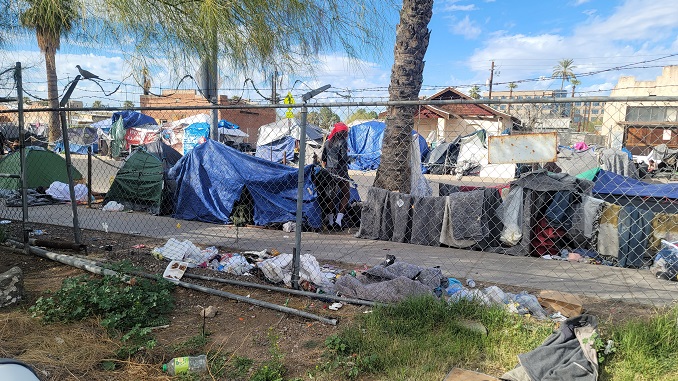
by Daniel Stefanski | Oct 7, 2024 | News
By Daniel Stefanski |
A Republican State Senator is bringing attention to the work she and her colleagues have accomplished for Arizonans in the recently completed legislative session.
State Senator Janae Shamp released a statement last week to mark the bills that went into effect in the Grand Canyon State this September. For most bills passed by the Arizona Legislature and signed by the governor each legislative session, those policies go into effect ninety days after the adjournment of the state House and Senate.
“Bills signed into law during legislative session this year officially took effect in September, with a few exceptions,” said Shamp. “Senate Republicans championed impactful laws that will combat issues such as child abuse, retail theft, and the use of artificial intelligence for malice, as well as laws to help support patients with serious mental illness and prospective homebuyers in Arizona.”
The first-term lawmaker highlighted one of her own bills that became law last month – SB 1232. Shamp added, “I personally made it my mission to help protect Arizona’s most vulnerable population from predators. I had several bills signed into law to protect our children and inform our communities, and I’m proud to say life imprisonment is now on the table for criminals who commit the most heinous crimes against our children! Sexual misconduct with a minor is now considered a class 1 felony punishable by natural life imprisonment if the child is 12 years old or younger and suffers serious physical harm.”
In the Fifty-Sixth Legislature – Second Regular Session, there were 259 chaptered bills that became law in Arizona. That number was up from the previous year’s session, when there were 205 chaptered bills that became law.
However, the number of bills becoming law in a divided state government, with Republicans controlling the Arizona Legislature and a Democrat in the Governor’s Office, was far lower than when Republicans had full control of government. In 2022, the last year of Republican Governor Doug Ducey’s administration, 388 chaptered bills became law. And in 2021, there were 447 chaptered bills that became law.
Daniel Stefanski is a reporter for AZ Free News. You can send him news tips using this link.

by Daniel Stefanski | Oct 6, 2024 | News
By Daniel Stefanski |
Before a resolution came about for a major union strike in the United States, one Arizona lawmaker was working on a proposal to provide some relief to his constituents.
Earlier this week, State Representative David Cook sent a letter to Mexico’s Consul General Yescas Mendoza to suggest “collaboration to explore diverting container shipments to Mexican ports, allowing goods to enter the United States through Arizona’s land ports of entry in an effort to minimize the economic impact of the union-led strike.”
The strike of approximately 45,000 American port workers impacted 36 ports. Many within the country were bracing for severe economic consequences due to these actions.
Cook said, “With the current port closures, we need creative solutions to ensure vital goods continue to flow and to minimize economic disruptions. Working with our Mexican partners to use their ports offers a practical solution that benefits both our states’ and national economies. It is crucial that we keep the lines of trade open, and I am confident this proposal can help reduce strain on our supply chains until U.S. ports are operational again.”
In his letter to the Mexican Consul General, Cook wrote, “I believe that by temporarily diverting shipping vessels to Mexican ports, we can alleviate the pressure caused by U.S. port closures and help maintain the flow of goods into Arizona and other affected regions. Mexican ports, such as those in Mazatlán could provide the logistic support necessary to manage this redirection, allowing for a more seamless transition of goods into the U.S. via Arizona’s land ports of entry. This approach could serve as a valuable stopgap measure until the strike is resolved.”
The fears about the lasting effects of this strike proved to be short-lived, as the International Longshoremen’s Association and the United States Maritime Alliance, Ltd. quickly came to a “tentative agreement on wages.” Both entities announced their decision to “extend the Master Contract until January 15, 2025 to return to the bargaining table to negotiate all other outstanding issues.”
Daniel Stefanski is a reporter for AZ Free News. You can send him news tips using this link.

by Daniel Stefanski | Oct 5, 2024 | News
By Daniel Stefanski |
A new poll has President Trump with another slight lead over his Democrat opponent in the Grand Canyon State as the November General Election approaches.
Emerson College Polling recently released its latest round of swing state surveys, showing former President and current Republican candidate for Commander in Chief, Donald J. Trump, with a narrow lead over Democrat candidate and current Vice President, Kamala Harris.
The poll, which was conducted September 27-28, has Trump up on Harris by three percent (50-47%). Emerson College Polling considered the responses of 920 likely Arizona voters to compose its results.
Some of the findings of the Arizona polling included the following:
- 37% of respondents approved of the job Joe Biden is doing as President, compared to 55% who disapproved.
- 40% approved of the job Katie Hobbs was doing as Arizona Governor, compared to 38%.
- Just over two percent of voters were undecided between Trump and Harris in the survey. Of those undecideds, 78% of respondents leaned toward Trump.
- Harris had a 49% favorable rating, compared to 51% unfavorable.
- Trump had a 49% favorable rating, compared to 51% unfavorable.
- The top two issues concerning voters in the survey were the economy (jobs, inflation, and taxes) and immigration.
- 53% of voters believed that Trump would be better for their personal financial situation, compared to 43% for Harris.
- 57% of respondents thought their communities were less safe than five years ago, compared to 19% who thought their neighborhoods were more safe.
- 60% of voters felt their economic situation was worse than it was five years ago, compared to 26% who felt it was better.
- 52% of respondents believed the U.S. government was spending too much on military aid for Ukraine, compared to 16% who believed there was too little American dollars for Ukraine.
Arizona’s eleven electoral votes will be critical for either candidate to win in the quest to hit 270 to win the White House.
Daniel Stefanski is a reporter for AZ Free News. You can send him news tips using this link.

by Daniel Stefanski | Oct 5, 2024 | News
By Daniel Stefanksi |
Arizonans looking for more information about a ballot measure that addresses the state’s growing homelessness issues can access vital research from a local think tank organization.
Late last month, the Common Sense Institute Arizona (CSI) released a report “on the economic and fiscal impact of Proposition 312, finding that there is indeed a link between the increase in homelessness and declining property values.”
According to CSI, “Proposition 312 is aimed at tackling Arizona’s growing homelessness crisis, offering property owners the opportunity to receive tax relief for costs incurred due to unmitigated public nuisances, such as homelessness, vandalism, property crime, and drug use.”
The report from CSI found “that under the status quo, property owners in areas with unmitigated public nuisances are seeing their values decrease in real value [while] homelessness is on the rise.”
“The rising rates of crime, homelessness, and drug activity in key areas of Phoenix appear to have taken a toll on property values and overall economic activity,” said Glenn Farley, Director of Policy & Research for CSI. “In this kind of environment of declining relative property values and higher crime rates, there are ongoing problems requiring mitigation – like security and cleanup costs. In practice, though, the real impact is likely to be preventive: local governments may ultimately be more proactive about mitigating these nuisances if this proposal is enacted than they are today.”
The Arizona-based Goldwater Institute took a position in support of Proposition 312 ahead of the November General Election. On its website, the influential organization wrote, “We saw it in Phoenix’s homeless Zone when the city allowed lawlessness to run wild. We saw it in Tucson, too. Amid rampant homelessness, hardworking Arizona taxpayers are being forced to bear the burden of a city’s refusal to do its duty to protect public health and safety, paying out of pocket to install fences, hire security, clean up garbage, human waste, and other hazardous materials themselves. Prop 312 ensures that when government fails to enforce existing laws regarding illegal camping, loitering, pollution, and other nuisances, taxpayers will no longer be forced to foot the bill.”
Proposition 312 was made possible by the Arizona State Legislature earlier this year, when Republicans led the way to pass HCR 2023, which, if eventually passed by state voters in November, would “allow a property owner to apply for a primary property tax refund if the owner documents expenses caused by a city, town or county adopting a policy, pattern or practice which declines to enforce existing laws or the maintaining of a public nuisance” – according to the overview provided by the state House.
In a statement after the successful passage of the bill out of his chamber, Senate President Warren Petersen said, “There are instances where local governments routinely and repeatedly fail their citizens by not enforcing laws. An example of this would be the City of Phoenix’s handling of the former homeless encampment known as ‘The Zone.’ This area was not only a public safety and public health disaster for those who camped there, but it was also a detriment to the livelihoods of small business owners who set up their shops in the area.”
Petersen added, “Money talks, and as a way to encourage municipalities to enforce the law, Speaker Toma and I teamed up to sponsor HCR 2023/SCR 1006. This measure is a ballot referral that would protect law-abiding citizens. If approved by voters, property owners would be allowed to request a refund for expenses incurred to mitigate the problem, up to the amount of their property tax liability. The funds would be deducted from the local government’s state shared revenue.”
The chamber’s president also noted that “all Senate Democrats voted ‘no’” on the referral.
The key findings from CSI about Proposition 312 are as follows:
- “Problem increasing: Crime, drug overdoses, unsheltered homelessness, and other public nuisances have risen dramatically in Arizona and the greater Phoenix area since 2019. But the impacts are disproportionate: the problem has become more visible in certain parts of the city. This creates a negative economic impact for those parts of the city where local officials have failed to enforce existing laws
- “Property Value Loss: Commercial properties in Phoenix affected by unmitigated public nuisances have seen market rent appreciation fall to just 15.7% between 2019 and 2023, compared to the citywide rate of 30.2%. This represents up to $2.1 billion in lost property value due to slower appreciation in areas with high levels of homelessness, crime, and public nuisances.
- “Increased Crime: In areas with high public nuisance activity, the average crime rates for drug offenses, burglaries, robberies, and arson were between 3 to 5 times higher than the Phoenix average, driving up costs for property owners due to increased security measures and property damage.
- “Impact on Businesses: Businesses located in areas with elevated public nuisance levels experience significantly lower property appreciation and higher vacancy rates. The economic toll of unmitigated public nuisances has made it harder for businesses to thrive in these areas.”
During the legislative process this year, representatives from Barry Goldwater Institute for Public Policy Research, QuikTrip, Arizona Free Enterprise Club, Arizona Chamber of Commerce, Arizona Food Marketing Alliance, and the National Federation of Independent Business, indicated their support for the proposal on the Arizona Legislature’s Request to Speak system. Representatives from the League of Arizona Cities & Towns, Living United for Change in Arizona, Arizona Coalition to End Sexual and Domestic Violence, Professional Fire Fighters of Arizona, Arizona Association of Counties, County Supervisors Association of Arizona, Arizona Housing Coalition, and several state cities and towns, signed in to oppose the measure.
Interested voters can read the full CSI report regarding Prop 312 here.
Daniel Stefanski is a reporter for AZ Free News. You can send him news tips using this link.

by Daniel Stefanski | Oct 3, 2024 | Education, News
By Daniel Stefanski |
Arizona voters in the state’s largest county will have the opportunity to hear from candidates for school board positions ahead of the November General Election.
Late last month, Maricopa County School Superintendent Steve Watson released a number of statements from candidates for 58 school board districts across his county.
143 candidate statements were published.
In a statement accompanying the release of comments, Watson said, “In every election we publish information about school board candidates, using their own words, because we’re committed to transparency and encouraging community engagement in our elections. School board races are not always the most high-profile, but they are still extremely important to the future of our neighborhoods and communities.”
There are 278 current Governing Board members, 235 Governing Board candidates seeking election, 177 Governing Board seats available this year, and 215 candidates appearing on the November ballot.
According to the press release issued by Watson’s office, “Of 235 candidates seeking a school board seat, 72 will automatically win a seat because only one candidate qualified for the ballot.”
Watson added, “Our largest districts have a lot of competition for these positions, while some of the smaller ones have less. It can be frustrating for voters to be told they can’t vote in a race because there was only one candidate running for the position.”
There were 81 elections canceled due to lack of competition, and 72 candidates appointed due to lack of competition.
Additionally, there are 20 write-in candidates, and nine seats with no candidates.
There are more than 750,000 students in Maricopa County.
Voters can access the statements from candidates here.
Early voting for the November General Election has already commenced in Arizona with more widespread ballot casting expected in the coming days.
Daniel Stefanski is a reporter for AZ Free News. You can send him news tips using this link.





